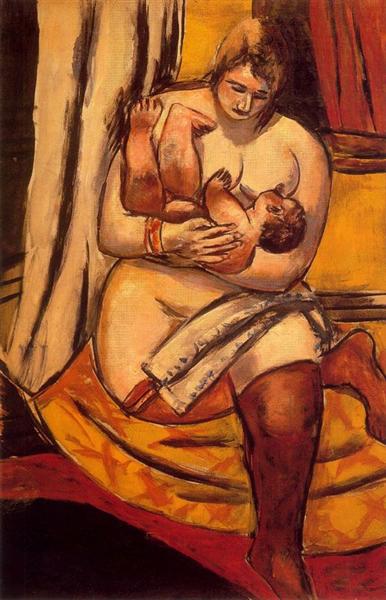Description
The work "Maternity" (Motherhood) by Max Beckmann is a moving portrait of one of the most universal and deep themes of human experience: motherhood. Painted in 1926, this oil on canvas resonates with the complexities of the mother-son relationship, while reflecting the unmistakable and expressionist style of its creator.
When observing the painting, the first thing that highlights is the powerful composition and the use of color, fundamental ingredients in Beckmann's work. The palette is dominated by warm tones, which evoke both the warmth and the intensity of maternal life. The yellow, oranges and reds intertwine in a background that seems to vibrate, providing the work of an energy that speaks of the connection between the mother and her son. This approach to color nuances also serves to amplify the feeling of intimacy, a key feature in expressionism, where emotions are privileged on traditional representation.
In the center of the work is the figure of a mother with her son, whose expressions and positions infuse painting a deep sense of protection and love. The mother, often portrayed in a gesture of hug or fastening, seems to be trapped in a timeless moment where care and devotion are palpable. However, what distinguishes Beckmann from other artists who address the same theme is their ability to combine the sublime with the human. The mother's figure is not idealized; It is real, full of conflicting emotions that make it even more relatable. Through his approach, Beckmann makes the viewer reflect not only on the beauty of motherhood, but also about the struggles and sufferings that often accompany this fundamental role.
The choice of a vertical composition, with the central figures occupying most of the canvas, is also significant. This arrangement not only directs the spectator's gaze towards the mother and her son, but also suggests the high ideals and charges that women often assume in their role as mothers. In addition, Beckmann uses the line and the way to create a sense of movement and dynamism, evoking the chaotic and complex nature of family life.
In the context of the art of the early twentieth century, "motherhood" is inserted within a greater dialogue about the human condition, a constant concern in Beckmann's work. His style, often marked by the distortion and geometrization of the figures, is a reflection of anguish and the search for identity in a world torn by conflicts. This painting, in particular, is aligned with other contemporary works that explore intimate relationships and the role of emotions, including those of artists such as Käthe Kollwitz, known for their powerful portraits of family and motherhood.
Beckmann's work is vivid, intense and, often, loaded with symbolism. Although it is not part of the traditional gender painting, "maternity" becomes a deep manifest on the most complex facets of being a mother. The viewer cannot avoid being trapped by the emotional force that emanates from this representation, which makes it one of the most notable pieces of his career.
Ultimately, "Maternity" is a testimony to Max Beckmann's talent to capture the essence of human experience. The work is a bridge between the intimacy of the home and the great themes of existence, which continues to resonate over time, evoking reflections on love, loss and struggle for life in a often hostile world. Thus, this painting is not only a representation of motherhood, but also an exploration of the human condition as a whole.
KUADROS ©, a famous paint on your wall.
Hand-made oil painting reproductions, with the quality of professional artists and the distinctive seal of KUADROS ©.
Art reproduction service with satisfaction guarantee. If you are not completely satisfied with the replica of your painting, we refund your money 100%.

